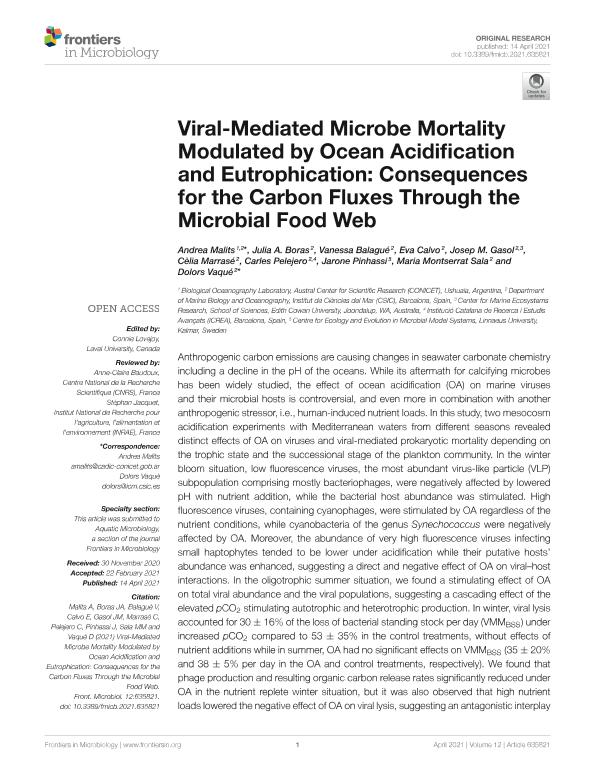Mostrar el registro sencillo del ítem
dc.contributor.author
Malits, Andrea

dc.contributor.author
Boras, Julia A.
dc.contributor.author
Balagué, Vanessa
dc.contributor.author
Calvo, Eva
dc.contributor.author
Gasol, Josep M.

dc.contributor.author
Marrasé, Cèlia
dc.contributor.author
Pelejero, Carles
dc.contributor.author
Pinhassi, Jarone
dc.contributor.author
Montserrat Sala, Maria
dc.contributor.author
Vaqué, Dolors
dc.date.available
2021-12-21T13:40:03Z
dc.date.issued
2021-04
dc.identifier.citation
Malits, Andrea; Boras, Julia A.; Balagué, Vanessa; Calvo, Eva; Gasol, Josep M.; et al.; Viral-Mediated Microbe Mortality Modulated by Ocean Acidification and Eutrophication: Consequences for the Carbon Fluxes Through the Microbial Food Web; Frontiers Media; Frontiers in Microbiology; 12; 4-2021; 1-19
dc.identifier.issn
1664-302X
dc.identifier.uri
http://hdl.handle.net/11336/149100
dc.description.abstract
Anthropogenic carbon emissions are causing changes in seawater carbonate chemistry including a decline in the pH of the oceans. While its aftermath for calcifying microbes has been widely studied, the effect of ocean acidification (OA) on marine viruses and their microbial hosts is controversial, and even more in combination with another anthropogenic stressor, i.e., human-induced nutrient loads. In this study, two mesocosm acidification experiments with Mediterranean waters from different seasons revealed distinct effects of OA on viruses and viral-mediated prokaryotic mortality depending on the trophic state and the successional stage of the plankton community. In the winter bloom situation, low fluorescence viruses, the most abundant virus-like particle (VLP) subpopulation comprising mostly bacteriophages, were negatively affected by lowered pH with nutrient addition, while the bacterial host abundance was stimulated. High fluorescence viruses, containing cyanophages, were stimulated by OA regardless of the nutrient conditions, while cyanobacteria of the genus Synechococcus were negatively affected by OA. Moreover, the abundance of very high fluorescence viruses infecting small haptophytes tended to be lower under acidification while their putative hosts' abundance was enhanced, suggesting a direct and negative effect of OA on viral–host interactions. In the oligotrophic summer situation, we found a stimulating effect of OA on total viral abundance and the viral populations, suggesting a cascading effect of the elevated pCO2 stimulating autotrophic and heterotrophic production. In winter, viral lysis accounted for 30 ± 16% of the loss of bacterial standing stock per day (VMMBSS) under increased pCO2 compared to 53 ± 35% in the control treatments, without effects of nutrient additions while in summer, OA had no significant effects on VMMBSS (35 ± 20% and 38 ± 5% per day in the OA and control treatments, respectively). We found that phage production and resulting organic carbon release rates significantly reduced under OA in the nutrient replete winter situation, but it was also observed that high nutrient loads lowered the negative effect of OA on viral lysis, suggesting an antagonistic interplay between these two major global ocean stressors in the Anthropocene. In summer, however, viral-mediated carbon release rates were lower and not affected by lowered pH. Eutrophication consistently stimulated viral production regardless of the season or initial conditions. Given the relevant role of viruses for marine carbon cycling and the biological carbon pump, these two anthropogenic stressors may modulate carbon fluxes through their effect on viruses at the base of the pelagic food web in a future global change scenario.
dc.format
application/pdf
dc.language.iso
eng
dc.publisher
Frontiers Media

dc.rights
info:eu-repo/semantics/openAccess
dc.rights.uri
https://creativecommons.org/licenses/by-nc-sa/2.5/ar/
dc.subject
CARBON FLUXES
dc.subject
EUTROPHICATION
dc.subject
MICROBIAL FOOD WEB
dc.subject
OCEAN ACIDIFICATION
dc.subject
VIRAL SHUNT
dc.subject.classification
Oceanografía, Hidrología, Recursos Hídricos

dc.subject.classification
Ciencias de la Tierra y relacionadas con el Medio Ambiente

dc.subject.classification
CIENCIAS NATURALES Y EXACTAS

dc.title
Viral-Mediated Microbe Mortality Modulated by Ocean Acidification and Eutrophication: Consequences for the Carbon Fluxes Through the Microbial Food Web
dc.type
info:eu-repo/semantics/article
dc.type
info:ar-repo/semantics/artículo
dc.type
info:eu-repo/semantics/publishedVersion
dc.date.updated
2021-12-03T18:03:38Z
dc.journal.volume
12
dc.journal.pagination
1-19
dc.journal.pais
Suiza

dc.journal.ciudad
Lausanne
dc.description.fil
Fil: Malits, Andrea. Consejo Nacional de Investigaciones Científicas y Técnicas. Centro Austral de Investigaciones Científicas; Argentina. Consejo Superior de Investigaciones Científicas. Instituto de Ciencias del Mar; España
dc.description.fil
Fil: Boras, Julia A.. Consejo Superior de Investigaciones Científicas. Instituto de Ciencias del Mar; España
dc.description.fil
Fil: Balagué, Vanessa. Consejo Superior de Investigaciones Científicas. Instituto de Ciencias del Mar; España
dc.description.fil
Fil: Calvo, Eva. Consejo Superior de Investigaciones Científicas. Instituto de Ciencias del Mar; España
dc.description.fil
Fil: Gasol, Josep M.. Consejo Superior de Investigaciones Científicas. Instituto de Ciencias del Mar; España
dc.description.fil
Fil: Marrasé, Cèlia. Consejo Superior de Investigaciones Científicas. Instituto de Ciencias del Mar; España
dc.description.fil
Fil: Pelejero, Carles. Consejo Superior de Investigaciones Científicas. Instituto de Ciencias del Mar; España
dc.description.fil
Fil: Pinhassi, Jarone. Linnaeus University; Suecia
dc.description.fil
Fil: Montserrat Sala, Maria. Consejo Superior de Investigaciones Científicas. Instituto de Ciencias del Mar; España
dc.description.fil
Fil: Vaqué, Dolors. Consejo Superior de Investigaciones Científicas. Instituto de Ciencias del Mar; España
dc.journal.title
Frontiers in Microbiology
dc.relation.alternativeid
info:eu-repo/semantics/altIdentifier/url/https://www.frontiersin.org/articles/10.3389/fmicb.2021.635821/full
dc.relation.alternativeid
info:eu-repo/semantics/altIdentifier/doi/http://dx.doi.org/10.3389/fmicb.2021.635821
Archivos asociados
